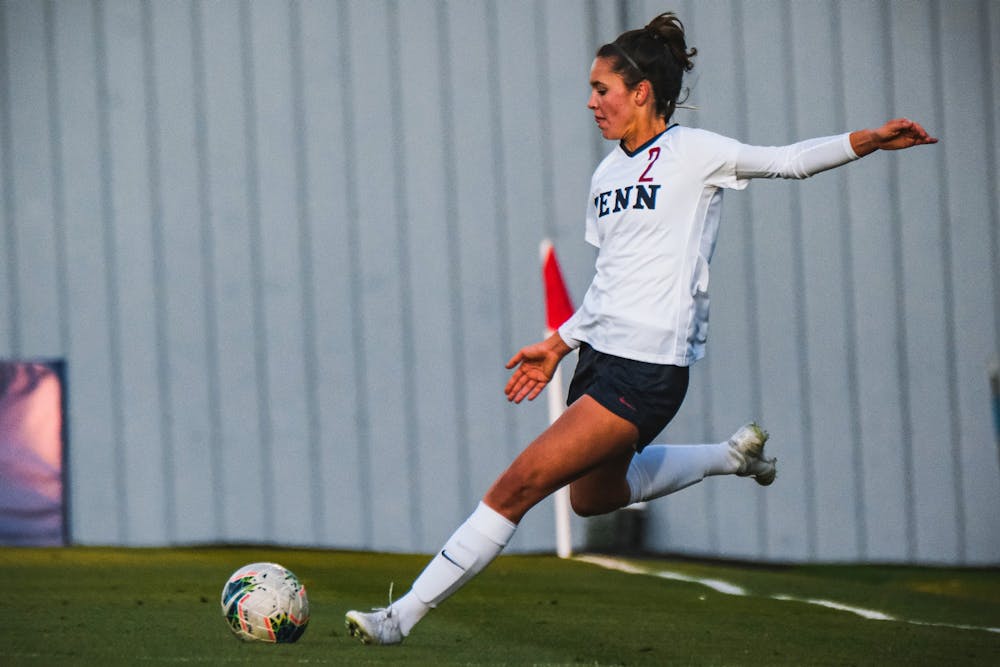
Forty-eight percent of female collegiate athletes experience depression or anxiety symptoms. That’s a statistic emphasized by Penn women’s soccer sophomore Peyton Raun when talking about why she joined Voice in Sport.
“[It's] a stat we always talk about,” Raun said. “I went through it when I was young, in seventh and eighth grade, so I think it’s so important to be able to talk about those things.”
Both Raun and her teammate senior Jadyn Wilensky are active contributors to Voice in Sport, an advocacy platform based in New York and launched by Stef Strack in 2019. The platform includes various professional experts who give advice, as well as community opportunities, such as a sports media internship program and a mentorship program.
Raun is a contributor to the latter. As a mentor, she helps lead one-on-one mentoring or small group mentoring sessions over Zoom, capped at five mentees, along with other collegiate and even professional athletes.
Throughout high school and college, Raun has been a part of Girls Soccer Worldwide, an organization dedicated to empowering women in sports globally. As a member of the organization, Raun traveled to Paraguay twice in order to coach and encourage young girls to pursue soccer. In March, Strack reached out to Raun to invite her to join Voice in Sport.
Driven by her own personal experiences, Raun was more than willing to become a mentor.
“I never had the opportunity to talk to people as I was going through recruiting or high school about sports,” Raun said. “I think there were a lot of moments in soccer where I felt very stressed and anxious, and those moments got really close to turning me away from playing completely. It would’ve been really key for me to have had someone to talk to about it.”
Raun works on outreach and with the marketing team on top of being a mentor. She helps reach out to girls at different clubs and schools to gauge their interest in joining, particularly young women in high school and at the end of middle school. For Raun, that marked one of the most difficult times as an athlete, when speaking to a student who had gone through the recruiting process would have been useful.
“[We’re] focusing on helping [those girls], who are trying to figure out their recruiting, who are navigating a lot of changes, whether it be their body, or their health, or their home,” Raun said. “I think a lot goes on in those years, and those are really formative.”
It was through Raun that her teammate, Wilensky, discovered the platform. Raun posted on Instagram that Voice in Sport was looking for people to become content creators for its sports media internship, and Wilensky expressed her interest before speaking to Strack personally over email.
As a content creator, Wilensky works with about 20 other mainly collegiate athletes to learn about writing and producing journalistic pieces. The internship primarily centers around trying to allocate resources and create opportunities for both younger and older female athletes to enter into journalism, an area in which few women have the space and platform to talk about sports.
Each writer is assigned a certain number of pieces a month, and they have a list of experts and professional athletes to whom they can reach out to interview. After collaborating with an editor, the pieces go onto the Voice in Sport platform.
“It’s really nice because each content writer has their own commitment and own path, and the way that they go about different things,” Wilensky said. “I don’t have a huge amount of experience in journalistic writing, so it’s really nice for me to have more time to learn about what it means to write and produce stories in that kind of form and conduct interviews.”
Wilensky is an English major at Penn, with a concentration in Africana Literatures and Culture. As a writer, Voice in Sport gave Wilensky the chance to explore journalism, which she largely doesn’t get to try at school. However, a large part of the reason why she was interested in Voice in Sport was not only for the opportunities it offered her by ways of journalistic writing, but also the program’s inclusivity.
The time that Wilensky saw Raun’s Instagram post in the spring coincided with various Black Lives Matter protests. A major driving force for her was also the program’s commitment to, in her view, true and inclusive advocacy.
“[Strack] tries to do it in a very conscious way; she was thinking a lot about the Black Lives Matter movement and representation and sexuality, to form a very inclusive community in a way I don’t know if I’ve ever seen before,” Wilensky said. “When you use terms like ‘women,’ are you actually representing all women, are you really trying to address social issues? I think that Voice in Sport was doing that, so that was one of the most attractive things for me.”
Raun and Wilensky both believe that Voice in Sport has, in many different ways, provided them with opportunities to use their voices in order to make a difference.
“The inequality that I still see going on in the world, especially soccer, [was a driving factor],” Raun said. “There’s such an inequality gap between [men] and [women], and it’s something we’ve been fighting for a very long time. I think it’s important for it to become more visible in the media and for more people to speak out.”
Wilensky in particular was struck by her personal conversations with Strack and the flexibility the program allows. Rather than a strict hierarchy to do things a certain way, Wilensky mentioned having discussions and a proper back-and-forth to approaching her writing and contributions.
“I’ve had so many conversations with Stef…where we’re working out — ‘what does it mean to think about non-binary athletes?’, and ‘what does it mean to think about sexuality?’, and ‘what does it mean to think about race and class?’” Wilensky said. “It’s a very collaborative and dynamic and new way of what it means to empower female athletes.”
“I will note, it’s a big issue and it obviously can’t be solved by a single group of college and professional athletes,” Raun said. “But it’s important to me to just get it out there.”
At the very core of it all, Raun and Wilensky are striving to use their platform and contribution to Voice in Sport in order to develop towards two final goals: empowerment and advocacy.
The Daily Pennsylvanian is an independent, student-run newspaper. Please consider making a donation to support the coverage that shapes the University. Your generosity ensures a future of strong journalism at Penn.
Donate






